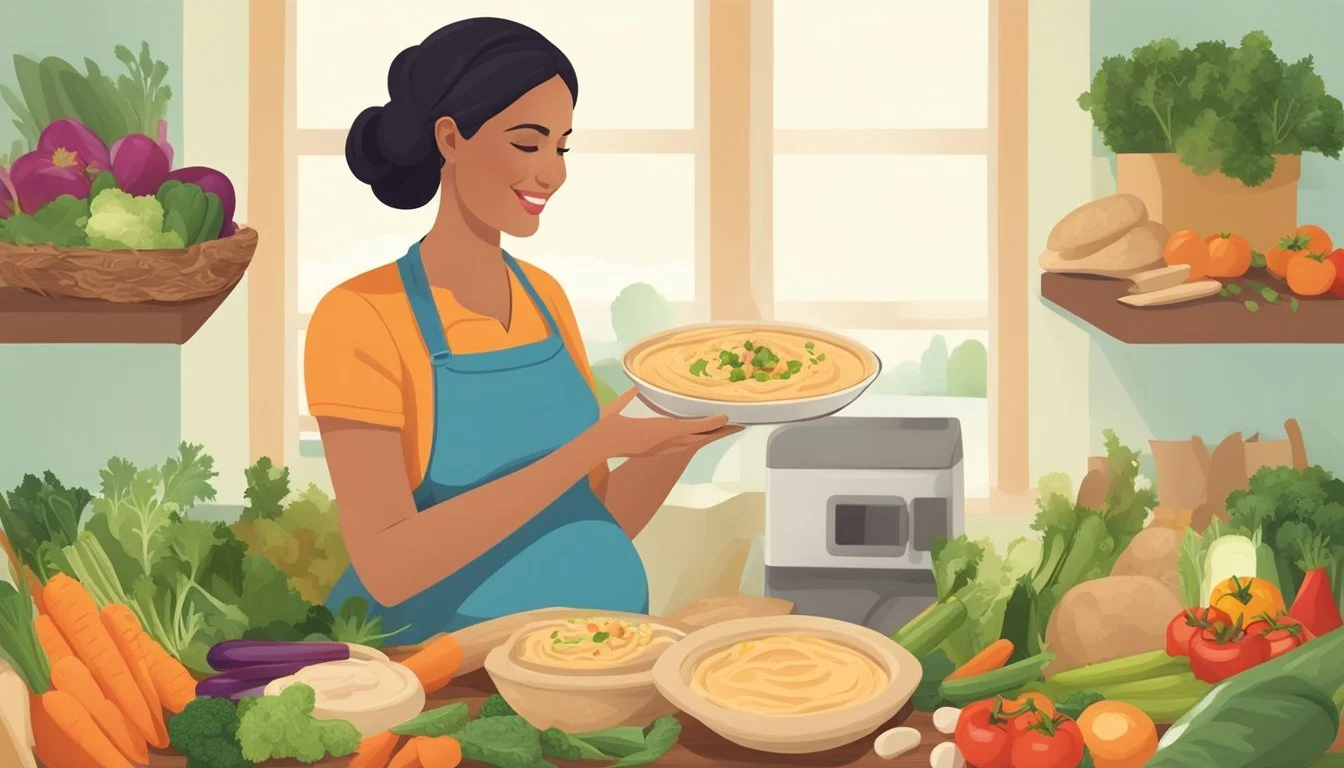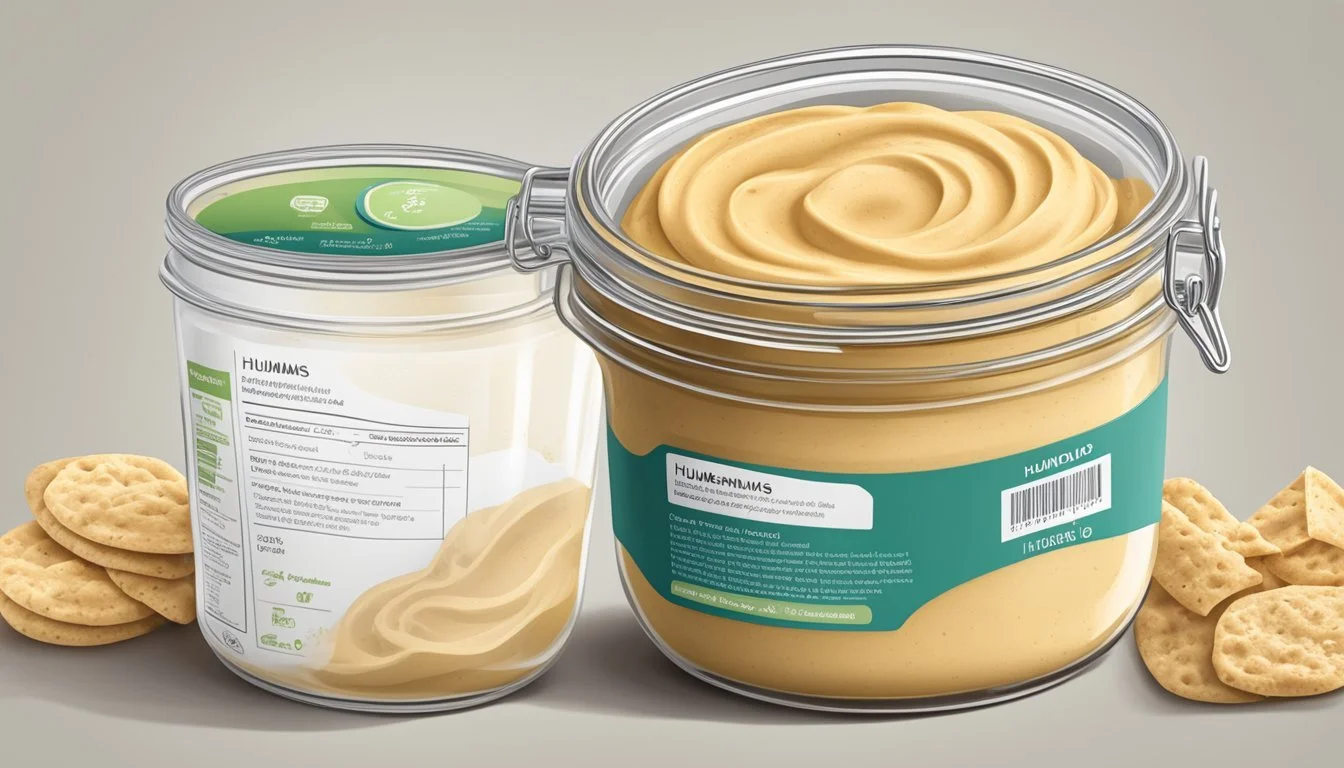Can Pregnant Women Eat Store-Bought Hummus?
Safety and Guidelines Explained
When considering the dietary choices of pregnant women, hummus often emerges as a topic of interest. It is a popular Mediterranean dip that is generally made from chickpeas, tahini, olive oil, lemon juice, and garlic. The nutritional profile of hummus, which includes protein, fiber, and healthy fats, makes it an appealing option for expecting mothers looking to maintain a balanced diet.
However, when it comes to store-bought hummus, there are additional considerations. While hummus can be a healthy snack for pregnant women, the key to its safe consumption lies in the handling and storage of the product. Store-bought hummus has to be selected and consumed with care, as it can be prone to contamination with bacteria such as listeria and salmonella, both of which pose serious risks during pregnancy.
Pregnant women are advised to ensure that any store-bought hummus is thoroughly checked for freshness, and that its storage conditions meet safety standards. Hummus that is past its expiration date, has an off smell, or has changed in texture should be avoided. Eating hummus in moderation, as part of a well-rounded diet, is recommended to enjoy the benefits while minimizing potential risks.
Nutritional Profile of Hummus
Hummus offers a diverse range of nutrients, making it a beneficial food item for many, including pregnant women when prepared and stored safely.
Macro and Micro Nutrients
Hummus is primarily made from chickpeas, which are a significant source of protein, fiber, and important minerals such as iron, phosphorus, and zinc. The inclusion of tahini, a paste made from sesame seeds, not only augments the flavor profile but also contributes to the hummus's content of calcium, magnesium, and healthy fats, including omega-3 fatty acids. The olive oil in hummus is high in monounsaturated fats, known for their heart-healthy benefits.
Common ingredients like garlic and lemon juice add to the hummus's nutritional value by offering additional vitamins and antioxidants. Below is a brief overview of the nutrient content found in hummus:
Protein: Essential for tissue repair and muscle building
Fiber: Aids in digestion and can help manage blood sugar levels
Iron: Crucial for oxygen transport and energy production
Calcium: Important for bone health
Potassium: Helps maintain electrolyte balance
Vitamins: Such as vitamin C from lemon juice, essential for immune function
Health Benefits for Pregnant Women
For pregnant women, hummus can be especially beneficial due to its content of folate, a vital nutrient that helps prevent neural tube defects in the developing fetus. The high fiber content may reduce the risk of constipation, a common issue during pregnancy. Additionally, the presence of calcium and magnesium supports the development of strong bones and teeth in the fetus while aiding the mother's health.
The combination of nutrients in hummus supports both the mother and baby's nutritional needs. It is a heart-healthy option with omega-3 fatty acids and antioxidants, which can support overall health during pregnancy. Here is a summarization of the key health benefits pregnant women can derive from hummus:
Folate: Essential for fetal development and reducing the risk of birth defects
Fiber: Alleviates constipation and promotes digestive health
Healthy Fats: Support the development of the baby's brain and contribute to cardiovascular health of the mother
Protein: Important for the growth of fetal tissue, including the brain, and helps maintain the muscles of the mother
Food Safety Concerns
When discussing the safety of store-bought hummus during pregnancy, it is crucial to address bacterial risks and implement safe consumption practices to minimize health concerns related to foodborne illnesses.
Listeria and Other Bacterial Risks
Store-bought hummus can be at risk of bacterial contamination, especially by Listeria monocytogenes and Salmonella spp., which are of particular concern during pregnancy. Listeriosis, the illness caused by Listeria, can lead to severe complications for both the mother and unborn child, including miscarriage. Salmonella can result in significant health issues such as severe food poisoning. The risk of such bacterial contamination is higher in ready-to-eat foods like hummus due to its high-water content and low acidity.
Listeria Risk:
Can thrive at refrigerator temperatures.
Pregnant women are more susceptible to infection.
Salmonella Risk:
Associated with poor hygiene in food prep.
Can cause debilitating food poisoning.
Safe Consumption Practices
To ensure safety, pregnant women should be diligent with food safety measures. When consuming store-bought hummus, they should:
Check Expiration Dates: Always ensure the product is within its safe consumption window.
Observe Storage Guidelines: Refrigerate promptly after purchase and keep sealed to prevent spoilage.
Hygiene Practices: Wash hands thoroughly before handling hummus to avoid introducing new bacteria.
Consider Homemade Alternatives: Making hummus at home allows for control over ingredient quality and hygiene conditions.
Providing both proper storage and strict adherence to hygiene principles are essential components in reducing the risk of foodborne illness from store-bought hummus during pregnancy.
Pregnancy-Specific Dietary Guidelines
During pregnancy, adhering to dietary guidelines that ensure the intake of essential nutrients is vital. Health experts emphasize the importance of consuming a balanced diet for the benefit of both the expectant mother and the developing fetus.
Guidance from Health Experts
Nutritionists and registered dietitians recommend that pregnant women focus on consuming calcium, iron, folate, and fiber -rich foods to support fetal development and maternal well-being. It is advised that pregnant women consult with healthcare providers to receive evidence-based guidance tailored to their individual nutritional needs. Portion control is crucial, and safety in freshness and preparation of foods should be a priority to minimize the risk of foodborne illnesses.
Incorporating Hummus into a Balanced Diet
Hummus, made from chickpeas and tahini, can be a nutritious addition to a pregnancy diet. It provides benefits such as protein, calcium, and fiber. However, when selecting store-bought hummus, pregnant women must ensure it is fresh and consume it in moderation. Pregnant women should consider the variety in their diet to avoid excessive consumption of any one food and prioritize homemade options to control ingredients and freshness.
Comparing Store-Bought and Homemade Options
When deciding between store-bought and homemade hummus, one must consider convenience, food safety, nutritional content, and customization.
Examining Store-Bought Varieties
Store-bought hummus is valued for its convenience. It is readily available in most supermarkets and comes in a variety of flavors. However, when choosing store-bought hummus, pregnant women should look for options that are properly sealed and stored at the correct temperature to minimize the risk of Listeria contamination. Pasteurized ingredients and the absence of preservatives are other factors that can influence the safety and nutritional profile of store-bought hummus. Labels should be checked for additives, as these can affect the overall nutritional value.
Key Nutrients in Store-Bought Hummus:
Healthy fats: Typically present from olive oil or sesame paste.
Vitamin E: A natural preservative found in quality hummus which also offers nutritional benefits.
Preparing Homemade Hummus
Preparing homemade hummus allows for complete control over ingredients and the opportunity to include more nutritious options like fresh garlic and lemon juice. Homemade hummus can provide healthy fats from pure olive oil and tahini, and by using fresh, high-quality ingredients, the nutritional benefits such as fiber, protein, and vitamin E can be maximized. Furthermore, homemade hummus can be a healthy snack choice by not including unwanted preservatives or excessive salt. Food safety is paramount when making hummus at home; one must ensure that all ingredients, particularly if using canned products, are pasteurized and that the kitchen environment is clean to reduce any health risks.
Making Homemade Hummus:
Select pasteurized canned chickpeas or cook dried chickpeas thoroughly.
Use fresh ingredients to enhance flavor and nutrition.
Maintain cleanliness to ensure food safety and prevent contamination.
Addressing Common Concerns
When discussing the consumption of store-bought hummus during pregnancy, it is essential to separate fact from fiction, consider healthy alternatives, and be aware of the potential risks associated with food safety. This section aims to clarify these points with evidence-based information.
Debunking Myths and Misconceptions
It is a myth that pregnant women cannot eat store-bought hummus. In fact, they can consume hummus as part of a balanced diet, provided they ensure the product's safety. Hummus, a Middle Eastern dip made primarily from chickpeas, is a source of plant-based protein and can be included in a pregnant woman's diet, supporting overall health. The key is to verify that the product hasn't passed its expiration date and doesn't show signs of spoilage.
Alternatives and Substitutions
For those who are concerned about consuming store-bought hummus, preparing hummus at home can be a safe alternative. Homemade hummus allows for better control over the ingredients and minimizes the risk of contamination. Substitutions such as using pasteurized ingredients and incorporating a variety of fruits, vegetables, or dairy can be considered to enhance nutritional value and flavor.
Potential Risks and Recalls
While hummus is generally safe, the potential risks are linked to foodborne illnesses caused by bacteria such as listeria or salmonella. The CDC keeps track of food-related outbreaks and recalls, providing information on symptoms and safety steps. Pregnant women are more susceptible to these risks, which in severe cases, can lead to miscarriage or premature delivery. Always check for recalls and consume products well before their expiration dates for optimal food safety.
Conclusion
Pregnant women considering the inclusion of store-bought hummus in their diets can do so, with attention to safety and quality. Hummus, with chickpeas as its base, is a source of protein and contains heart-healthy fats from ingredients like olive oil. When part of a balanced diet, it contributes positively to the nutritional needs during pregnancy.
Precautions for Pregnant Women:
Food Safety: Opt for hummus with no preservatives or additives; read labels carefully.
Freshness: Check expiration dates diligently.
Home Preparation: Whenever possible, preparing hummus at home is advisable for full control over the ingredients.
Portion Control: Maintain portions within reasonable limits. Excessive consumption of any food item, irrespective of its health benefits, is to be avoided.
For an optimal diet, pregnant women should consider:
A variety of protein sources
Foods rich in fiber to support digestion
Intake of healthy fats that contribute to a balanced diet
Incorporating hummus as a part of meals or as a snack can complement a nutrition-rich diet when consumed with proper care. Pregnant women should always consult with healthcare providers regarding their diets to ensure personalized and safe nutritional choices.






